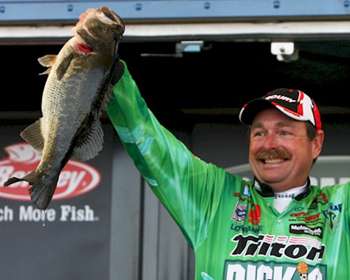
Ask a bass angler to voice his thoughts on spinning gear, and you'll usually get a mild snicker followed by the claim that their only use is for smallmouth or open water. After all, what self-respecting, diehard bass fisherman would eagerly profess his fondness for spinning gear?
Count veteran Florida angler and Elite Series pro Shaw Grigsby as being among the growing crowd of spinning gear junkies. "Being out on the Elite Series, it surprises me how many guys — some of whom are some really good jig fishermen — don't own a spinning rod," he says. "To me, spinning tackle is no different than having a specialized tool in your toolbox. There are just absolutely some really cool and effective techniques that can't be done with anything else."
Grigsby points out that a mechanic's toolbox doesn't house one screwdriver and one crescent wrench — there are dozens of specific tools required for the myriad of situations he might encounter in a day's time. Bass fishing should be no different, he says. "Baitcasting equipment is designed for heavy line applications, and there's nothing better for that job; however, when you get to light line techniques, you won't be as successful unless you're using spinning gear."
The problem, as Shaw describes, is that baitcasting equipment simply has too much power for lighter line — hence the angler is constantly fighting an uphill battle when the situation requires finesse. "Spinning tackle is generally designed for lighter baits and lighter line," he says. "That's not to say that you can't fish both on casting gear, but I guarantee you that it's a hundred times easier on spinning gear."
He explains that anglers who have previously balked at spinning gear and lighter line as being "wimpy" and unable to handle the strain of larger bass no longer have much of an argument as a result of new low-diameter braided lines on the market. "You can put 20-pound braid on your spinning gear and have just as much confidence as you did with it on your casting gear," he says. "With today's braid, I've been able to use spinning gear in situations that previously I wouldn't have, like skipping docks and fishing around heavy cover."
Shaw's affection for spinning gear has lead him to work them into his arsenal of "must have" equipment whenever he leaves the dock. In fact, he uses spinning tackle about 40 percent of the time during competition. "I always have at least six spinning rods rigged and ready whenever I leave," he says. "I don't care if it's for just a one-day tournament that's going to be a muddy Mississippi River type of deal. It's just a great, great tool to have in your box at all times.
"It's just something that makes you a well-rounded fisherman, and you have to have the tools to get the job done."
(Provided by Z3 Media)




